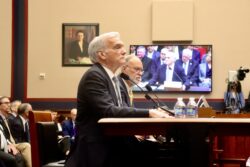Early on Wednesday morning the Georgetown Israel Alliance altered its endorsement criteria for GUSA presidential candidates to remove all language about the Boycott, Divest, and Sanction Movement. The change came in response to outrage from Arab students over GIA’s original endorsement criteria requiring candidates to affirm their support for a democratic, Jewish Israel and oppose the BDS Movement.
BDS is a global initiative calling for universities to boycott, divest from, and impose sanctions against Israeli organizations or companies are alleged to support settlement construction in the West Bank and deny equal rights to Palestinian people.
When information leaked to the student body that GIA would only offer an endorsement to GUSA candidates that “firmly oppose any Boycott, Divestment, and Sanctions (BDS) resolution at Georgetown University,” many students—in and out of GUSA—responded with strong opposition to the GIA’s leadership statement on social media.
Nabeel Zewail (SFS ‘15), Zaid Saqr (NHS ‘15), and Aziz Saqr (NHS ‘15) co-authored an opinion piece posted on Facebook denouncing the leadership statement on Tuesday night, criticizing GIA for seeking the support of GUSA candidates for its statement in a process that “silences a much needed discussion on Georgetown’s campus.”
Zaid Saqr said, “Preemptively asking GUSA candidates to oppose any BDS resolution on campus, without the input or involvement of the student body, stands against the idea of fostering a positive dialogue around the Palestine-Israel conflict.”
GIA President Harper Weissburg (SFS ’17) said that the content of the statement was not made public because at the time it had not been finalized. According to Weissburg, GIA planned to release its finalized statements as well as a list of its endorsements at a later date. She also criticized the Zewail, Saqr, and Saqr for writing the op-ed without actually reading the content of the leadership statement. “People have been acting on behalf of rumors,” she said.
Weissburg denied accusations from Zewail, Saqr, and Saqr that intent of the leadership statement was to stifle dialogue. She said that she sought support from GUSA on Israel-Palestine issues because the the Georgetown chapter of Students for Justice in Palestine observes the organization’s national policy of “antinormalization,” which means that it refuses to collaborate with pro-Israel student groups. “Our entire point to this [leadership statement] is preserving open dialogue … even with the BDS language the intent of [the statement] was not to say that BDS could not come to campus.” Weissburg said she hopes that GUSA could serve as an intermediary between the two sides of the Israel-Palestine debate. “We are not politicizing GUSA… We [GIA] need GUSA. They now have to be our in between.”
After the op-ed was posted, GIA entered into a dialogue with Zewail, Saqr, and Saqr and amended the language of its leadership statement to remove language about BDS. The final statement released by GIA reads: “We affirm our support for students and student groups that advocate for Israel’s right to exist as a Jewish and democratic state. We will always stand for positive campus dialogue that brings different Georgetown communities together around a peaceful resolution to the Israeli-Palestinian conflict.”
Zewail said that with the publication of the amended statement he had accomplished his goal in writing the op-ed. “At least now we’re pushing the conversation forward instead of silencing it before it even got started,” he said.
Only Tim Rosenberger (COL ‘16) and Reno Varghese (SFS ‘16) affirmed GIA’s amended proposal. Rosenberger and Varghese, who signed on to statement’s original wording that included opposition to BDS, said that in spite of their personal beliefs on BDS, they supported the proposal in the interest of protecting free speech on campus. In a public statement they wrote: “Once BDS is officially sanctioned on campus, there is an end to free speech, dialogue is stifled.” Despite this, apart from the Rosenberger/Varghese ticket, the rest of the GUSA tickets decided that international politics was not within the purview of a GUSA election.
Some campaigns have accused GIA of misrepresenting the nature of their statement and of exaggerating the support their proposal had received in order to pressure other campaigns to sign on. In a public statement, the Wadibia/Cheney ticket rescinded its support of GIA’s statement.
“We were told erroneously that the BDS resolution would foster open dialogue on college campuses across America, but yesterday evening, we discovered our trust was taken advantage of and we as a ticket were lied to,” they wrote in an email to the Voice.
Weissburg called Wadibia’s response a “knee-jerk” reaction based on unsubstantiated information.
Both the Luther/Rohan and Margolis/Shymansky tickets received email requests from GIA to sign their leadership statement [Full disclosure: Connor Rohan is a staff writer for the Voice]. The email received by Luther and Rohan claimed, “The other GUSA tickets have all signed on already.” However, the email received by Margolis and Shymansky included similar wording.
GIA Board Member Ari Goldstein (SFS ‘18), who sent the emails on behalf on GIA, said that this was a misunderstanding because before Monday he did not know that the Luther/Rohan ticket was a serious presidential bid.
However, according to Abbey McNaughton and Will Simons, their ticket never signed onto GIA’s pledge to begin with. “We have not explicitly signed onto [GIA’s] pledge as a ticket up to this point,” They wrote in an email to the Voice. According to GIA, they had received affirmation of McNaughton and Simon’s support prior to this statement from McNaughton and Simon’s campaign manager.
Despite these discrepancies and miscommunications between GIA and GUSA tickets, GIA insists that its only intention in issuing the leadership statement was to foster dialogue.
“We are very appreciative of all the positive conversations we have had with GUSA candidates,” Goldstein said. “We hope that we can come to a solution that we can all stand for.”



